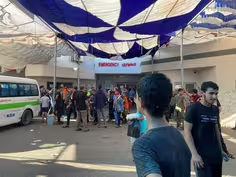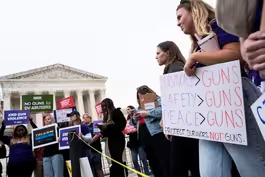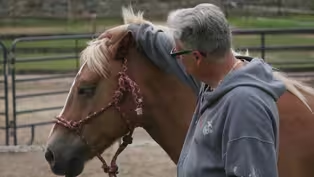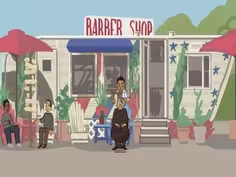
Why vasectomies are on the rise after the end of Roe
Clip: 11/11/2023 | 4m 47sVideo has Closed Captions
Why vasectomies are on the rise after the fall of Roe v. Wade
Data shows that interest in vasectomies as a form of birth control is on the rise after the Supreme Court struck down the constitutional right to seek an abortion in 2022. To learn more, John Yang speaks with communities correspondent Gabrielle Hays, who talked with doctors and patients in Missouri about their experiences.
Problems playing video? | Closed Captioning Feedback
Problems playing video? | Closed Captioning Feedback
Major corporate funding for the PBS News Hour is provided by BDO, BNSF, Consumer Cellular, American Cruise Lines, and Raymond James. Funding for the PBS NewsHour Weekend is provided by...

Why vasectomies are on the rise after the end of Roe
Clip: 11/11/2023 | 4m 47sVideo has Closed Captions
Data shows that interest in vasectomies as a form of birth control is on the rise after the Supreme Court struck down the constitutional right to seek an abortion in 2022. To learn more, John Yang speaks with communities correspondent Gabrielle Hays, who talked with doctors and patients in Missouri about their experiences.
Problems playing video? | Closed Captioning Feedback
How to Watch PBS News Hour
PBS News Hour is available to stream on pbs.org and the free PBS App, available on iPhone, Apple TV, Android TV, Android smartphones, Amazon Fire TV, Amazon Fire Tablet, Roku, Samsung Smart TV, and Vizio.
Providing Support for PBS.org
Learn Moreabout PBS online sponsorshipJOHN YANG: Since the Supreme Court struck down the right to seek an abortion last year, health providers across the country say there is more interest in vasectomies as birth control.
And there are efforts to make the procedure more accessible.
Communities correspondent Gabrielle Hays spoke with doctors and patients in Missouri, which is where she's based.
Gabby, I want to get to your conversations in a bit.
But first, is there data or the hard numbers to illustrate this?
GABRIELLE HAYS: Yeah, there absolutely is, you know, we got a bit of a peek of what that looks like earlier this year, when researchers from the Cleveland Clinic release data that essentially shows that nationally, we saw more than a 30 percent increase in requests for vasectomies, and then a more than 20 percent increase in people actually, you know, going through with the procedure.
But I think, you know, when we talk about the state of Missouri, providers here tell me they've seen an increase here as well to the point where they have been working even at more than a year later after the Dobbs decision to bring more access to the procedure to the uninsured and underinsured.
JOHN YANG: And tell us about the situation in Missouri, which is where you are now.
GABRIELLE HAYS: It's important to note that almost immediately after this Dobbs decision came down last year that Missouri essentially made it illegal to get an abortion in the exception.
The only exception was a medical emergency.
And so providers tell me that, you know, they saw the number of people getting vasectomies rise as much as 100 percent last year.
You know, for instance, a perfect example would be Planned Parenthood held a three-day vasectomy clinic and three different cities across state of Missouri.
That was open to 100 people, a 100 people signed up 91 of them, I'm told, actually follow through and got the procedure.
So they say that the need is exponential, but not just in Missouri, it's we're talking about states surrounding Missouri, in part other parts of the country.
I spoke to a doctor, Dr. Esgar Guarin also known as Dr. G, who has a mobile clinic in Iowa, he came from Iowa to St. Louis to help with the -- with vasectomy patients last week, and he tells me, even in his state where he is with his mobile clinic, he drives all over the state in order to bring access to people not only looking for the procedure, and his state, but people coming from out of state to get it as well.
DR. ESGAR GUARIN, Simplevas Vasectomy Clinic: So normally, I was doing not that many 40, 45 vasectomies in a month.
And then within the first 48 hours, 20 people signed up and we saw a bump of 100 percent in the number of vasectomies that we did in July of 2022.
And that trend continue for three more months, and eventually it kind of came down.
But at this moment ever since the Roe v Wade was overturned, I can tell you that we have not gone back to the pre-Dobbs decision numbers.
So I can tell you that at least for our clinic, a 30 to 50 percent overall increase in the numbers.
We've noticed since then, so it was a big impact.
GABRIELLE HAYS: Dr. G made it clear to me that even in those 48 hours post Dobbs decisions last year, he saw a 300 percent increase in just traffic to his website alone.
He's in Iowa now still performing vasectomies and is about to head out of country.
And so far, he says he's performed at least 5,000th of a second he's in his career.
JOHN YANG: And Gabby, in addition to providers, you spoke with patients as well, what did they tell you?
GABRIELLE HAYS: For one, the patients that I spoke to who got the procedure last year who got it this year, say that this is something that they had been thinking about for a long time, right?
They just -- were trying to figure out what access would look like, you know.
One person I spoke to last week told me that he got it after the Dobbs decision because he was afraid that at some point maybe the option wouldn't be available to him in the future.
But then you have other folks, like another person I spoke to last week who got the vasectomy last week who said you know his decision to get it wasn't a direct result of Dobbs, but he understood how people could make that connection and further just the mere access to being able to get a vasectomy, he said is a basic human right and so that's why he got it.
But providers also tell me, you know, the access to them is important because they hear from patients that there are some doctors who won't do it for patients because they say they may change their mind later, JOHN YANG: Communities correspondent Gabrielle Hays.
Gabby, thanks a lot.
GABRIELLE HAYS: Thank you.
Gaza hospitals go dark as calls for cease-fire intensify
Video has Closed Captions
Clip: 11/11/2023 | 3m 21s | Hospitals go dark in Gaza as pressure on Israel for cease-fire intensifies (3m 21s)
How gun laws affect the role of firearms in domestic abuse
Video has Closed Captions
Clip: 11/11/2023 | 4m 40s | How gun policies affect the role of firearms in domestic violence (4m 40s)
These horses help veterans cope with the trauma of combat
Video has Closed Captions
Clip: 11/11/2023 | 6m 29s | In Connecticut, these horses are helping veterans cope with the trauma of combat (6m 29s)
A veteran’s story about the power of a haircut
Video has Closed Captions
Clip: 11/11/2023 | 2m 7s | A veteran’s story about the power of a haircut (2m 7s)
Providing Support for PBS.org
Learn Moreabout PBS online sponsorship
- News and Public Affairs

FRONTLINE is investigative journalism that questions, explains and changes our world.

- News and Public Affairs

Amanpour and Company features conversations with leaders and decision makers.












Support for PBS provided by:
Major corporate funding for the PBS News Hour is provided by BDO, BNSF, Consumer Cellular, American Cruise Lines, and Raymond James. Funding for the PBS NewsHour Weekend is provided by...



